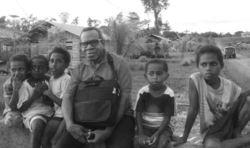
Pastor Felix Amias during a visit to the Moi people of Malalilis in, Papua Barat Province, Indonesia.
Malalilis oh Malalilis, what fate has befallen you?
By Pastor Felix Amias, SKP Merauke Archdiocese
Malalilis is a village belonging to the Moi people in Sorong Regency, Papua Barat Province. The village is located quite far from the main road and with few inhabitants, but with an immense forest. What is it like now? Maybe it was because the forest was so vast and the inhabitants sparse that outsiders considered that the forest had no owner, and so cleared 40,000 hectares and planted an oil palm plantation. This area used to be part of a logging concession,but has now been converted into a lease title for cultivation. Now the Moi people in this place live a precarious live in the middle of an oil palm plantation owned by PT Henrison Inti Persada (HIP) What follows are the stories of the inhabitants, recorded when participants in the Conference for Indigenous Communities affected by Investment in the Land of Papua visited on Sunday, 4th December 2016. How sad it was….!
“We’re not against development, but as we understand it, development has to benefit us too. But what has been happening? They tear down our forest, they don’t respect us, their behaviour towards us is as if we weren’t the landowners. Some of the ways they treat us include: We’re not allowed to walk around the plantation in search of food during the daytime, they say if we want to look for food, go ahead, but just do it at night-time; 2) We are not able to keep livestock at home. They go from house to house and kill our animals, especially dogs, but those are the dogs we use to go hunting and find food”
“There’s a lot more we have to put up with. We’ve shouted about this all over the place, but it seems that all the doors are closed for us. Our young people who fight for our rights are just arrested by the police and put in prison. And then the men or women who work as labourers on the plantation, they have been fired without a reason and without severance payments. And at the same time, we no longer have the forest with which to sustain ourselves.”
“Even more cruelly, we used to work for the company when it first started, and when we were thirsty and asked for water to drink, they just said to us to drink the water from the ditch. Before the forest was felled we could drink water from pools, swamps, rivers, and even without boiling it we never got sick. Now they use so many chemical sprays and then tell us to drink the water. Where do you come from? Who are you anyway? Why are we being told to drink ditch-water full of chemical sprays?”
“They have cleared land for smallholdings [a contractual obligation to provide a new livelihood for local people- tr]. They’ve felled our forest down to the bare earth, and you can see for yourself the weeds and thick undergrowth over there. We don’t know if there’s any government looking after us or not, because it seems that they’re just leaving us on a road to obliteration. The women that work have to leave for work at 4.00am, and what about the children they leave at home, our future generation? Are they deliberately trying to wipe us out? Are we citizens or aren’t we? If a woman is suffering from period pains and wants medicine from the clinic, she has to show sanitary pads as proof before they will attend to her.”
“Now it is as if we are living in prison. If we want to leave to the city we need to report to the security post and it’s the same when we arrive back home. Being treated like this drives us to oppose the planting of oil palm trees on the smallholding land. Just leave the cleared forest, leave it alone, eventually the forest wil grow back”
This village’s position, in the interior, far from the main road, means that such improper treatment can take hold more freely. In a more crowded place which people could get to more easily, then we would see that the people who do these things would be more cautious. The situation is similar in Merauke (southern Papua), where a subsidiary of a large palm oil company has taken up position near the mouth of the Digoel River, which is diffucult for many people to get to, and a local indigenous landowner has reported that injustice, intimidation and land grabbing are all established practices. If this sort of thing is happening, then who is actually breaking the law in this country? Is it them or us? Be aware that the people who are destroying us – and indeed this country – is not us, it is them. Let’s hope that this destiny is not a curse on us, God help us.











